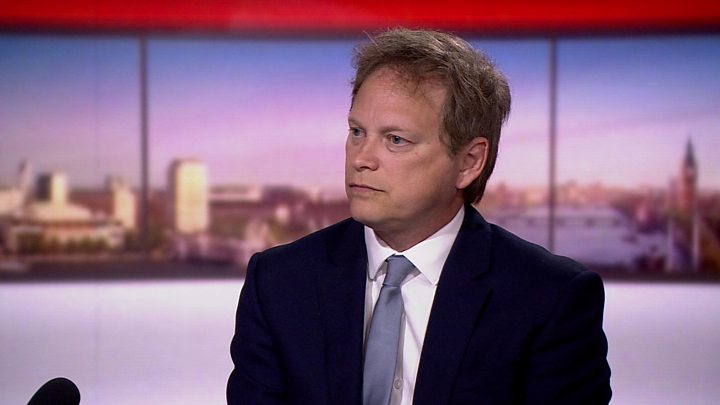Reduced hot-desking and alternatives to social distancing where it is not possible are among measures being considered to let workplaces reopen.
A draft government plan to ease anti-coronavirus restrictions seen by the BBC also urges employers to minimise numbers using equipment, stagger shift times and maximise home-working.
The prime minister will reveal his "roadmap" out of lockdown on Sunday.
Unions are concerned about companies' ability to source protective kit.
Leaders say efforts to acquire personal protective equipment (PPE) for workers could see businesses competing with the NHS for scarce and essential supplies.
The draft strategy seen by the BBC says additional hygiene procedures, physical screens and the use of protective equipment should be considered where maintaining distancing of 2m (6ft) between workers is impossible.
However, the section marked PPE contains only a promise that "more detail" will follow.
"Reopening the economy will take more than modified working practices," writes BBC business editor Simon Jack.
"Workers must be confident they are safe. Companies must be confident they won't be sued if they get it wrong. And consumers must be confident enough to spend money."
Many companies have been shut since widespread limits on everyday life were imposed on 23 March, in a bid to limit the effects of the virus's spread on the NHS.
Ministers are obliged to review those restrictions by Thursday.
During Sunday's daily briefing, Cabinet Office minister Michael Gove stressed the UK would not be "flicking a switch and going... back to the old normal".
He indicated there would be "a phased approach... which allows us to monitor the impact that those changes are having on public health".
The number of coronavirus-related deaths in the UK stands at 28,446 - an increase of 315 on Saturday's figure - with 14,248 people currently being treated in hospital.
However, admissions have fallen, along with the number of critical care beds being used.
BBC political correspondent Chris Mason says the prime minister will examine data, take advice on how much the virus has been suppressed and assess the potential consequences on infection rates of changes to rules, before setting out plans next Sunday.
Responses received last night to the draft workplace guidelines from companies, business groups and unions will also be taken into account.

Media playback is unsupported on your device
Rail unions have written to Boris Johnson expressing concerns about plans by operators to increase the number of trains in service.
"We will not accept new working patterns that put the lives of railway workers and passengers at risk," says the joint letter from ASLEF, RMT and TSSA.
On Sunday, Transport Secretary Grant Shapps told the BBC more buses and trains would run but that asking companies to stagger employees' working hours could help to prevent crowded commutes.
In other developments:
- Businesses including sole traders and limited companies are able to apply for "bounce-back" loans of £2,000 to £50,000, 100% guaranteed by the government
- Boris Johnson will urge countries to "pull together" and share expertise as he co-hosts an international conference to drive the race for coronavirus treatments, tests and vaccines
- The government said 76,500 coronavirus tests were carried out on Saturday, short of its 100,000 daily target
- A drug developed by UK scientists to treat Covid-19 patients is being trialled at University Hospital Southampton
- University students in England must pay full tuition fees even if courses are taught online in the autumn, the government says
- France, Italy and Spain register their lowest daily death tolls for weeks as they prepare to ease restrictions
https://news.google.com/__i/rss/rd/articles/CBMiJGh0dHBzOi8vd3d3LmJiYy5jb20vbmV3cy91ay01MjUyNTEyN9IBKGh0dHBzOi8vd3d3LmJiYy5jb20vbmV3cy9hbXAvdWstNTI1MjUxMjc?oc=5
2020-05-04 03:06:28Z
CBMiJGh0dHBzOi8vd3d3LmJiYy5jb20vbmV3cy91ay01MjUyNTEyN9IBKGh0dHBzOi8vd3d3LmJiYy5jb20vbmV3cy9hbXAvdWstNTI1MjUxMjc
Tidak ada komentar:
Posting Komentar